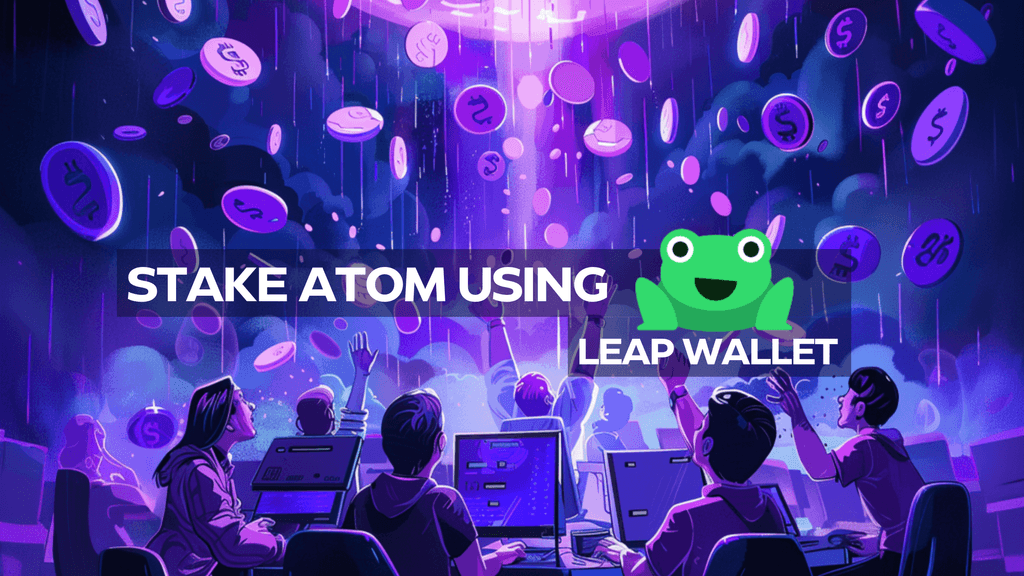Hi Cosmonauts! ⚛️
Thank you for tuning in and welcome aboard! My name is Estelle and I hope everyone is doing great today, welcome to the Cosmos ecosystem news roundup. Here are the top stories in the Cosmos ecosystem for the 2nd half of June:
Can Cosmos get ahead of Ethereum and other crypto projects by launching Opt-in and Mesh security before Fraud Proofs are ready with Fraud votes? What are Fraud votes or Fraud Proofs? Why Fraud votes are possible in Cosmos but not in Ethereum? All the answers are in this episode. Native USDT in Cosmos, by when and what are the implications? What are the goals, details and next steps of the Akash GPU testnet? Stride becoming soon a consumer chain of the Cosmos Hub and Duality aiming also to become a consumer chain. Explaining the different incentives, benefits and costs of Replicated security for consumer chains, ATOM stakers and validators. Chorus One and several community members in the Cosmos Hub forum sounding the alarm about centralization risks unless the costs and revenues of consumer chains are better balanced. Why the soft opt-out feature may not be enough and supporting smaller validators is becoming critical and urgent. Mito Finance testnet built on Injective, what is it and why is it one of the most anticipated Web3 projects? What are the new Osmosis Supercharged Liquidity Pools? How have the Osmosis staking and LP yields changed with the new OSMO tokenomics?
All this and a lot more in today’s episode, remember to click the like and subscribe buttons and also the notifications icon. Remember that we recently included three new focused sections about Secret Network, Injective and Stride. We are about to launch as well a new Crypto regulations and compliance section, in partnership with two leading Swiss firms focused in blockchain law and compliance. Without further intro, here is the news!
Tech
Cosmonauts, there is a discussion in the Cosmos Hub forum about enabling Opt-in and Mesh security with Fraud Votes. Let’s first review again the differences between Replicated security, Opt-in security and Mesh security.
Replicated security requires consumer chains to have a governance proposal passed on the provider chain before launching. Then, apart from the bottom 5% by voting power who can soft opt-out, all validators in the provider chain are required to run all consumer chains, leading to some cost concerns especially for the smaller validators. Replicated security could launch already in the Cosmos Hub since Fraud proofs are not required.
The advantage of Opt-in security is that the permissionless launch of consumer chains without a governance proposal is possible. Moreover, validators could choose whether to run certain consumer chains. Another advantage of Opt-in security compared to Mesh security is that consumer chains don’t need their own validator set, similarly to Replicated security. In addition, Mesh security works differently by allowing stakers to delegate to validators on other chains.
So why Fraud proofs are required for Opt-in and Mesh security but not for Replicated security?
There is a type of attack called incorrect execution attack, consisting of a one third cartel of stakers signing a block that simply breaks the rules of the chain. The slashing for this type of attack is complex and requires Fraud proofs which are still under development. In the case of Replicated security, since consumer chains are secured only by the provider chain, this incorrect execution attack done on a consumer chain would be equivalent to an attack to the Cosmos Hub itself, and since then this would have a negative effect for the ATOM price there are then incentives not to perform this attack. In summary, since for Replicated Security incorrect execution attacks are not a risk given the incentives not to perform these attacks, then Fraud proofs are not required and that’s why Replicated security could launch already.
In the case of Opt-in security or Mesh security, these incentives not to do incorrect execution attacks and hence keep consumer chains safe are not so clear. This is because the responsibility for an attack could be complex to identify. In the case of Opt-in security, since only a subset of validators would opt-in for a specific consumer chain, the negative effects on the price of ATOM after an incorrect execution attack could be less and hence possibly not enough to prevent the attack so Fraud proofs would be required for slashing. The Fraud proofs would also be required for Mesh security, since here there are subsets of delegators making it even more complex to identify responsibility for an incorrect execution attack. Since Fraud proofs are still under development, this is preventing the launch of Opt-in and Mesh security.
The Akash GPU Testnet period is from June 20th to July 11th 2023. The goal of this testnet is to help test the first open-source cloud for GPUs and AI, and there are over $100k in available rewards for the hundreds of participants who signed up. The testnet started with the GPUs onboarding, including a range of Nvidia GPUs such as H100, A100, V100 and more. Several tasks in the testnet would include benchmarking GPU performance, deploying AI models or defining deployment specs. The link for further information and to join the Akash GPU testnet is included here.
DeFi/Staking
Tether announced the launch of USDT in the Cosmos ecosystem by deploying USDT on Kava from July 3rd. This is positive news since USDT is the largest stablecoin with a marketcap of around three times larger than the second biggest stablecoin USDC. USDT was already available in other ecosystems such as Ethereum, Avalanche, Polygon, Solana and more, so it is great that it is now also available in the Cosmos ecosystem. In the Mintscan explorer, Kava
Project launches & network upgrades
With the OmniFlix Hub upgrade v0.11.0 the existing onft and marketplace modules will be updated and improved. In addition, new modules will be introduced, the ITC or Interact-to-Claim module and the Streampay module. These new modules were previously live on the testnet. The ITC module allows to create campaigns with the input of an NFT and a claim after an interaction, which could be Burn, Transfer or Verify. This then allows participants that interact and claim to receive rewards in NFTs, Fungible tokens or both. The ITC module allows for a better engagement of communities.
The other new module, the StreamPay module, supports three types of programmable payment streams: continuous with tokens being streamed every second, periodic with a frequency hourly, daily or weekly for example, and delayed which is similar to a scheduled transfer of tokens.
In addition to this upgrade, OmniFlix also announced that through its integration with Babylon now OmniFlix transactions have added protection with Bitcoin timestamps. Furthermore, following the launch of Nolus and Gitopia with StreamSwap which was built by OmniFlix, now Quasar Finance
Governance
There are several updates regarding Cosmos Hub consumer chains. Firstly, Neutron, the first consumer chain onboarded, raised a $10 million funding round led by CoinFund and Binance Labs. Proposal 799 to onboard Stride as a consumer chain passed and hence the Stride blockchain will transition to Replicated security on July 19th. Stride will allow, similarly to Neutron, the bottom 5% of voting power validators to soft opt-out. Proposal 800 passed to provide 450,000 ATOM from the community pool to the stATOM/ATOM liquidity pool on Astroport Neutron. However, this 450k ATOM will be received by the AADAO to establish an stATOM/ATOM liquidity position on Astroport Neutron. Also, quoting from the proposal ‘If an alternative arrangement to steward this liquidity is not established by Cosmos Hub governance before October 1st, 2023, then on that date the ATOM Accelerator will begin the process of returning the full 450K ATOM to the community pool’. The stATOM/ATOM pool on Astroport Neutron will have some APR which will be received by the AADAO, there is no mention about this or whether all gains from the APR will be automatically added back to the pool. Furthermore, to obtain the stATOM for the pool, the AADAO would need to liquid stake a large amount of ATOM via Stride. There is also no mention about the staking rewards from staking these ATOM or whether the AADAO would keep the rewards or add all rewards to the pool also. In addition, with this
The signalling proposal in the Cosmos Hub 801, titled Gravity DEX Liquidity Module Removal, passed. It was decided to remove this module due to its lack of utility and costs of keeping it on the Cosmos Hub. During the next Cosmos Hub upgrade, a migration script will run which will return ~99% of the unwithdrawn tokens directly back to the identified owners.
Zaki is suggesting a plan in the Cosmos Hub forum to launch the Liquid Staking Module (LSM) earlier. Instead of waiting to be launched as a modular part of the SDK, it could be launched earlier as a separate branch. The suggested plan is to keep the LSM as a separate SDK branch for several Cosmos Hub releases until the SDK 0.50, expected in Autumn 2023. Then, the LSM could be a modular part of the SDK and the LSM branches could be removed.
Airdrops
Cosmonauts remember that if you haven’t yet claimed your Neutron airdrop, there is a deadline to claim it of three months after Neutron’s launch. Your claimed tokens will be vesting and unlocking over a three month period. Unclaimed tokens will be permissionlessly transferred to the Cosmos Hub community pool.
With the Omniflix upgrade v0.11.0 the new Interact to Claim (ITC) module was introduced. This ITC module, as previously explained by the OmniFlix team, would allow the process required for the FlixDrop of burning an eligibility NFT and then receiving fungible FLIX tokens.
Events/conferences
The Awesomwasm event will be in Berlin from 12–13 July, and one day before, on the 11th July the ATOM Berlin meetup is planned. Then, the Osmocon event will be in Paris the 21st July, and a few days later also in Paris the Nebular Summit event from the 24–25 July.
Osmosis news
The previously suggested changes to the Osmosis tokenomics have been implemented. Changes in the following four settings were combined to optimize for the best outcome: reduce inflation by 50%, increase ratio of staking to 50%, reduce pool incentives to 20%, reduce to 0 the share of pool incentives to community pool and reduce superfluid discount to 25%. As you can see here, by adjusting these four parameters, the overall result was that the inflation and circulatory inflation was reduced while the net staking yield and net LP yield were increased.
Two proposals passed to approve the initial Supercharged Liquidity incentive structure and the authorisation of the mechanism and process of the deployment of Supercharged Liquidity pools on Osmosis. Thanks to these pools, there is a major improvement of the efficiency of liquidity on Osmosis by concentrating a liquidity provider’s tokens around any chosen finite token ratio.
Users in Osmosis will be able to migrate their liquidity into a new position in the respective Supercharged Liquidity pool without the 14 day unbonding period, preserving also the Superfluid staking status.
Regarding the incentive model for Supercharged liquidity, it would be based on the amount of liquidity being utilised and incentives are manually claimed rather than distributed at epoch.
Moreover, Supercharged liquidity positions won’t be bonded, but bonding would be required for users wishing to participate in Superfluid Staking.
There will be incentives to encourage migration from classic pools to supercharged pools, once all pools have migrated then the permissionless supercharge pool creation will be proposed, until then it will be permissioned through governance.
In addition, for the permissionless creation it would still be restricted to a whitelist of quote assets managed through governance.
Juno news
Wynd announced Wynd Jungle to allow the creation of pools without the on-chain governance waiting period. With Wynd Jungle it is possible to create a pool for 500 Wynd tokens and start engaging in the Wynd DeFi ecosystem.
Dimi released an article explaining why he is bullish on Juno. The article covers the origin of Juno, the strengths of Juno as well as suggested actions to address urgent issues related to Juno, to read the full article the link is here.
Persistence news
Persistence announced that the Foundation Delegation Program Round 3 will be postponed and the delegations from the round 2 will be extended and potentially adjusted. Once the next chain upgrade is completed, Persistence will share the new timelines for the Round 3 of the Foundation Delegation Program.
Babylon announced its testnet integration with Persistence, thus providing additional security to Persistence by leveraging the security of Bitcoin as a reliable timestamping service. This partnership brings enhanced transaction security and an strengthen infrastructure to Persistence.
AssetMantle news
The MantleWallet offers a wide range of functionalities beyond voting, staking or sending transactions. It is possible also to do farming directly from the MantleWallet and several other additional functionalities. To learn more about farming via the AssetMantle wallet or to check directly these functionalities we included the links here and here.
Some amazing art from the MantlePlace includes the Charlatans of Osaka, Allone Yellow edition, DopeSkulls or AlphaCitizens. There are MantlePlace Creator Quests available in Zealy with MNTL tokens as reward.
The Frontier Wallet announced MNTL staking available in the Frontier extension.
Secret Network news
Secret Network released a tutorial about how to use the Secret tunnel. While the tutorial is specific for Binance Smart Chain, the same steps can be used also for other supported networks such as Polygon, Avalanche, Ethereum and others. Since the assets bridged are converted to SNIP-25 they are private by default, to see the balances you must have a permit or viewing key. To check the tutorial you can follow the link here.
An interesting Secret Network article explores the Blockchain Privacy Limitations of Zero Knowledge Proofs or ZKPs. The article explains what are ZKPs and mentions that while ZKPs are great for peer to peer transactions, it isn’t ideal and can’t keep that same data private on a global scale or in the realm of secure computation. The article claims that making DeFi private isn’t possible with ZKPs alone since ZKPs cannot make a smart contract or a DEX private. However, it is described in the article that when combining ZKPs with multi-party computation or MPC the possibilities of ZKPs could be greatly enhanced. For all the details you can check the full article in the link here.
Shade protocol announced that on June 27th, the final airdrop will go live, including for SCRT and ATOM stakers from 2021. In addition, Shade staking will also go live.
Injective news
Mito Finance is built on Injective and it is amongst the most anticipated Web3 projects. Mito Finance offers automated strategy vaults for passive yield generation and also a sophisticated token launchpad. In addition, users can create custom portfolios and increase their earnings on autopilot. From the 22nd of June, selected community members were able to begin using the Mito testnet in order to automate their trades and earnings.
Helix is a decentralized derivatives exchange built on Injective allowing to trade unlimited cross-chain spot and futures markets. Recently, it reached over $10 billion in volume thus becoming one of the largest DeFi protocols.
As more protocol revenue is generated by dApps built on Injective, more burns are done led by the Injective community. Recently, $50k in INJ was burnt by the community, being one of the largest burns so far.
Stride news
The current Stride incentive program began on June 7th and will end on July 6th, then on July 7th a new 30 day program will begin. The incentives will be provided in various stToken pools in Osmosis, Forge in Evmos, Shade on Secret Network and Astroport. For the 30 days, there will be in total incentives of around 182k STRD tokens and around $160k worth of other tokens.
stIBCX launched, which is the first liquid staked index token. By liquid staking IBCX it is possible to receive stIBCX, backed by the same tokens as IBCX but liquid staked by Stride. However, when a token in the IBCX basket isn’t available yet for liquid staking in Stride, it would be included in its unstaked form. These tokens will be liquid staked once they are available for liquid staking on Stride in the future.
General crypto news
CACEIS received a crypto custody licence in France. CACEIS is a leader in Europe for asset servicing with several trillions of dollars worth of assets under custody and under management.
Conclusion
And that’s all for today’s Cosmos ecosystem bi-weekly review Cosmonauts. If you enjoyed it please remember to click the like button, the subscribe button and also the bell notifications icon. Thank you so much for reading Cosmonauts and I’ll see you all very soon in the next episode!
Youtube video version: https://youtu.be/M6W-EjfXicg
Telegram group: https://t.me/CosmicValidator
Twitter: https://twitter.com/CosmicValidator
Website: https://cosmicvalidator.com
Business enquiries: [email protected]


